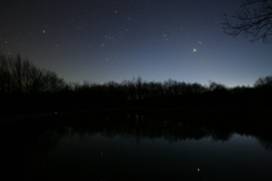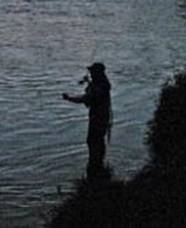NIGHT FISHING

Whether you're a pan fisherman, a bass fisherman or a trout bum, eventually you'll wind up trying your hand at night fishing. The romance of catching really big fish out in the open waters away from the protection of their day time sanctuaries is just too good to pass up! The lure of the 'lunkers' at night creates an irresistible urge to nail that big one that's going to the taxidermist.
Many fishermen venture into to the experience without preparation or concern for the tactics or safety precautions that are needed for a successful night experience. A little preplanning can sometimes make the difference between a disaster and a truly memorable outing.
Whether boating or wading, the most important of all preparations is to know the waters that you'll be fishing. If you aren't familiar with the waters then a 'recon' is called for. A baptism is more dangerous in a night situation then at any other time. Shifting sands, boulders, submerged logs and deep holes become dangers that could more easily be avoided during a daytime situation when you're using your sight.
 Let's outline a few basic safety precautions to consider, especially when planning a wading trip. Avoid fishing in rapid currents or waters where there are strong undertows. A wading staff is a must! I rarely use one during the day unless the current is swift or the water is so murky that I can't see the bottom, but for night fishing it becomes my eyes. It will announce the presence of unseen structures on the river's floor and will help you to avoid deep holes that might otherwise overtop your waders. I also use an inflatable flotation vest. Most modern ones today can be set for manual or automatic use. Admittedly, I've never had to use one but I sure feel safer and more confident just knowing that I have it on. Under no circumstances fish in rapid currents or waters where there are strong undertows. Another must is a couple of flashlights --- that's right, two at least! I use a hat clip-on and I carry a spare in my vest. I also bring a lantern. If I'm boating it helps to announce my presence to other boaters and wading fishermen. If I'm wading it helps to guide me back to the shore line where I put in. Don't forget the insect repellant and an insect-hat net. Many a trip has been ruined by mosquitoes and other flying night varmints.
Let's outline a few basic safety precautions to consider, especially when planning a wading trip. Avoid fishing in rapid currents or waters where there are strong undertows. A wading staff is a must! I rarely use one during the day unless the current is swift or the water is so murky that I can't see the bottom, but for night fishing it becomes my eyes. It will announce the presence of unseen structures on the river's floor and will help you to avoid deep holes that might otherwise overtop your waders. I also use an inflatable flotation vest. Most modern ones today can be set for manual or automatic use. Admittedly, I've never had to use one but I sure feel safer and more confident just knowing that I have it on. Under no circumstances fish in rapid currents or waters where there are strong undertows. Another must is a couple of flashlights --- that's right, two at least! I use a hat clip-on and I carry a spare in my vest. I also bring a lantern. If I'm boating it helps to announce my presence to other boaters and wading fishermen. If I'm wading it helps to guide me back to the shore line where I put in. Don't forget the insect repellant and an insect-hat net. Many a trip has been ruined by mosquitoes and other flying night varmints.
But, the most important advice I can give you, would be to fish with a friend. Not only will the trip be more fun, but, you'll be acting as each others safety nets. Besides, it would be a shame to catch a really big one without being able to share the experience with someone.
Line tangles are always a major problem at night. They're hard enough to deal with during the day; at night they become increasingly difficult to handle. Try removing the tippet, just fish with the leader. The tippet is not really needed at night, there will be less line to worry about, and it will cut down tremendously on the number of tangle situations. Keep your cast short. Remember you now have the advantage of not being seen by the trout. Remember that this is not sight fishing, but sound fishing. Cast to sounds heard on the water and remember the trout are also reacting to sounds and vibrations that they can hear and feel. Fly presentation is not nearly as important at night. Fly selection is a matter of personal choice. If there is a night hatch on, in most cases that will dictate your selection. If there is no hatch on, my advice to you is that 'big' is a good choice. Since I'm basically a dry fly fisherman, I try to select a pattern that can be fished both dry and then wet. This cuts down the number of times that I have to change flies.
 Fishing at night can and is a fun and relaxing experience. There is less fishing pressure then during the day. Most fishermen claim that the fish run bigger and the trout are more forgiving of a not so perfect cast. Enjoy, but do it safely!
Fishing at night can and is a fun and relaxing experience. There is less fishing pressure then during the day. Most fishermen claim that the fish run bigger and the trout are more forgiving of a not so perfect cast. Enjoy, but do it safely!
See you on the water…..
Tom Deschaine
Westland, Michigan
~www.michigandryflies.net~
Copyright2011©Deschaine
